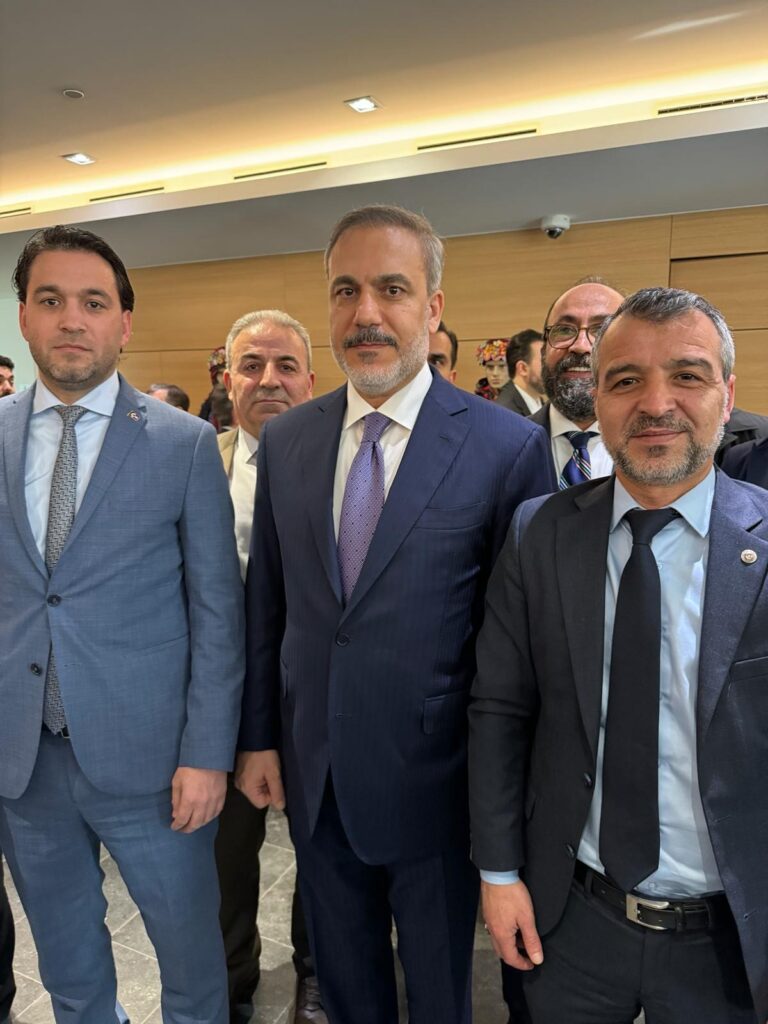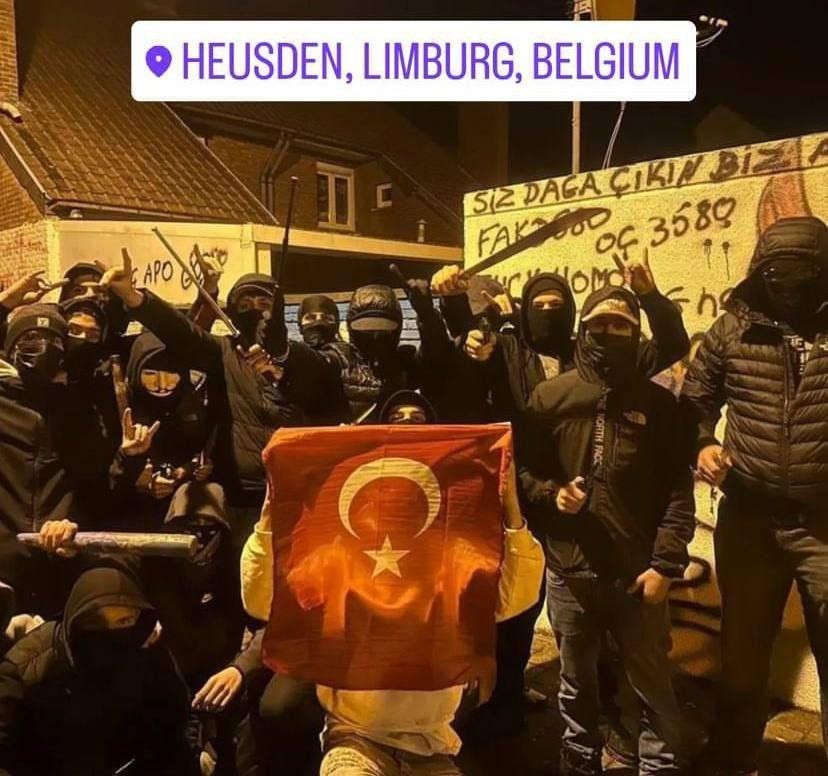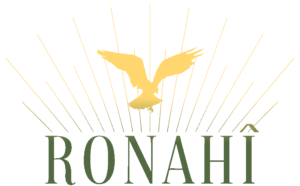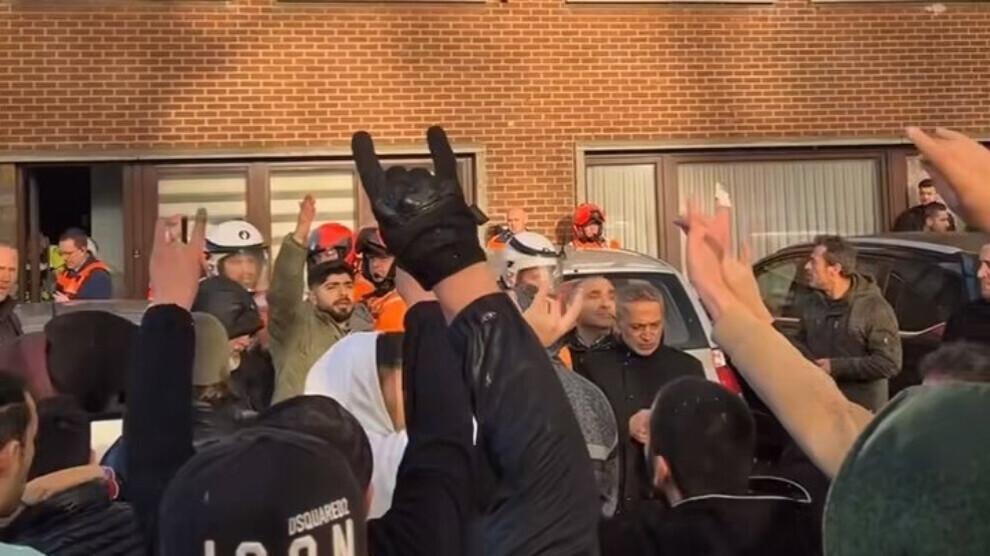Heusden-Zolder, Belgium.
Normally, the small town in the Limburg region does not attract a lot of attention.
But on 24th of March, it became the scene of violence and stir-up hatred against Kurdish residents. Hundreds of Turkish fascists have gathered around the house of a Kurdish family, shouts of “Allahu akbar” can be heard, the shattering of glass as car windows are smashed and the smell of fire as the attackers burn Kurdish scarves and flags.
In the Belgian media, the incidents are presented as a conflict between Kurds and Turks, that started after a provocation and escalated afterwards.
However, a look at the recent events and especially the developments in Turkey in the last weeks give rise to the conclusion that these attacks are not random outrages.
Attacks to benefit the AKP’s election campaign
With the approaching communal elections in Turkey, the atmosphere is extremely tense both in Turkey and in the diaspora.
After in the last communal elections in 2019 Erdoğan’s AKP failed to claim victory in the big cities, they are now even more determined to win back the metropolises, above all Istanbul.
In addition to the access to considerable resources that comes with controlling the metropolis, Erdoğan also has a personal interest, as he himself was mayor here in 1990 and then lost the city to the opposition in the last elections.
Looking at previous elections, we see that the Turkish candidates, backed up by Erdoğan and the state institutions are not fighting with fair means.
Both the local elections and the presidential elections of recent years were characterized by electoral fraud, better access to the polling booths for AKP-affiliated citizens and the removal and imprisonment of democratically elected opposition politicians.
The government with Erdoğan at the lead leaves no opportunity unused to influence the social mood in a way that serves their purposes.
Around a week before the events in Belgium took place, Foreign Minister Hakan Fidan also visited the country. In addition to his official appointments, he also met with representatives of the UID, the Union of International Democrats, which is known as AKP’s lobby organisation, that campaigned for Erdoğan in the presidential election together with representatives of DITIB and the Grey Wolves.
The attacks must also be viewed in the light of these visits.
Shortly after the attacks became known, the Turkish Foreign Ministry issued a statement in which it blamed the Kurdistan Workers’ Party (PKK) for provoking the riots, presenting it as if defenceless Turkish youths had been attacked by terrorists.
They hereby also refer to the statements of Yasin Gül, deputy mayor of Heusden-Zolder, who in an interview with Turkish television spoke of “provocation on the part of the Kurds, to which the Turkish citizens naturally reacted sensitively”.
Yasin Gül was expelled from his former party, the “Flämische Christdemokratische Partei”, in 2019 due to his proximity to the “grey wolves” – the same grey wolves who proudly hold their salute up to the camera during the attacks.
The Belgian media largely adopted his narrative unquestioningly, ignoring the fact that a large part of the attacked Kurds were simply families with children.
The videos shared on various online platforms by the attackers themselves paint a different picture than the one presented by the Turkish media and Yasin Gül.

Pictures of violence and destruction
The videos and pictures that they themselves posted online show hundreds of Turks, mostly men, armed with knives, sticks and safety gloves, standing in front of the house of a Kurdish family. They proudly raise their arms to show their greeting, the “wolf sign”, while shouting racist and sexist insults, as well as “Allahu akbar” (“God is great”). They smash windows of the house and the surrounding cars, destroy and burn scarves in the Kurdish colors – red, yellow and green – and repeatedly try to set the house on fire.
Inside, dozens of Kurds, including children and old people, have sought refuge. Most of them were on their way home from the Newroz celebrations that took place all over the country.
Newroz, one of the most important celebrations in Kurdish culture, welcomes spring and marks the beginning of the new year.
Especially in the face of this day, the image that presents itself is even more cruel.
This scene goes on for some time while the Belgian police looks on.
Only when other members of Kurdish society arrive on the scene to support those trapped inside, the police does intervene and evacuate the house.
At this point, much of the family’s property is destroyed, cars were attacked and vandalized, several Kurdish-looking people were dragged out of their cars onto the street and beaten until they lost consciousness.
At the time of writing, several people are still being treated in hospital, some of them seriously injured.
The extent of the attacks, the high number and strong armament of the attackers make it evident that this is not, as portrayed in the media, an one-off spontaneous event in response to a provocation, but rather a planned action.

Grey Wolves pose as Erdoğan’s securityguards
It is not the first time, that the Grey Wolves have attracted attention in a phase of political unrest.
The ultra-nationalist, neo-fascist and Islamist “Üküncü” movement, better known as the “Grey Wolves”, is considered part of the Turkish deep state structures (anti-democratic forces within the Turkish political structures) and is responsible for numerous, often deadly attacks on minorities such as Kurds, Alevis, Armenians and political dissidents.
Especially in the 1970s and 1980s, the Grey Wolves were known as the paramilitary arm of MHP, the “Nationalist Movement Party”.
The man who founded the Grey Wolves, Arpaslan Türkeş, is the same man who founded the MHP – the same MHP, incidentally, that together with Erdoğan’s AKP forms the government in Turkey.
The Grey Wolves are thus not an independent group that acts spontaneously according to its own agenda, but rather an instrument that Turkey uses to influence political dynamics in its favor, especially in the diaspora.
In his absence, they act as representatives of his nationalist and discriminatory ideas in other countries; in his presence, they serve him as security guards: During his last state visits, Erdoğan was literally accompanied by a convoy of Grey Wolves that secured the way for him.
In Germany, they are the largest far-right movement. While there was still talk of a ban in 2020, the issue has increasingly disappeared from the agenda of German politicians in recent years.
Part of a bigger picture
The events in Belgium cannot be viewed in separation from the general developments in Kurdistan and Turkey.
As the elections are approaching, Erdoğan is working hard to raise the image of Kurds disturbing the peace, creating an atmosphere of hate and fear against Kurdish people.
This image is backed up by the Turkish media, which speak of attacks by PKK members and activly call on Turks to defend themselves.
This atmosphere is at yet another level convenient for the Turkish state, as the indications for a renewed military offensive on South Kurdistan are increasing.
For years, Turkey has been using air and land operations to militarily seal off the Iraqi border with Turkey in the Gare mountain region and thus restrict the PKK’s freedom of movement.
The result is the depopulation of villages, displacement and injury or even killing of the inhabitants.
In order to pave the way for an invasion, diplomatic talks have been held at various levels in the recent weeks and months – but ultimately Turkey also depends on the international community accepting or turning a blind eye to his plans.
Should Turkey conduct this operation, Erdoğan will benefit if the image of the “terror-Kurds” he likes to create prevails in the rest of the world.
The media coverage in Belgium is already playing its part in it, portraying the Kurds as a disruptive factor for the national peace and security.
The fact that Belgium in particular, a country where the PKK is not banned, is now using this language can already be classified as a victory for Erdoğan in his war of annihilation.
It is also no coincidence that these attacks took place on Newroz, one of the most important days for the Kurdish people.
Grey Wolves, backed up by the nationalist and homogenising ideology of the Turkish state, see the Kurdish identity as inferior or even non-existent, as something that needs to be assimilated or destroyed. Their hate and violence is directed against all cultural minorities and follows a racist and fascist narrative.
The time and situation, in which the attacks took place, as well as the burning of Kurdish symbols illustrates, how the events in Belgium are not to be reduced to a conflict between Turkish and Kurdish individuals that evolved after a provocation, but as a serious attack on Kurdish life in general that has to be seen in a bigger political context.

